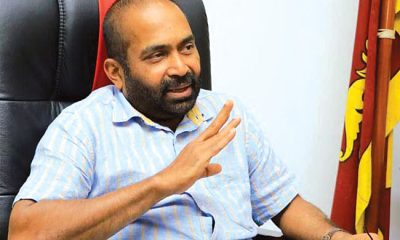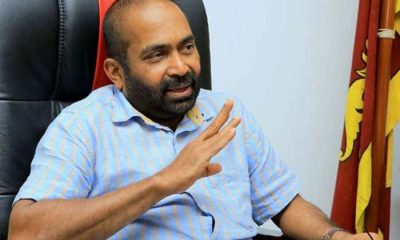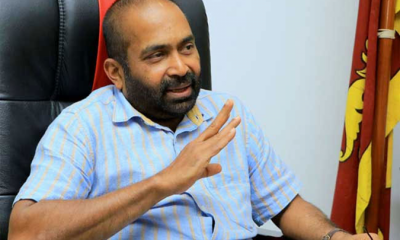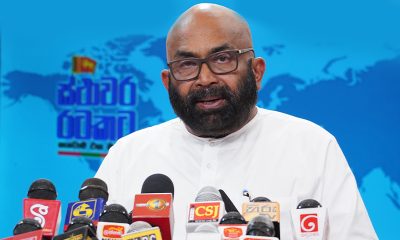News
SL wouldn’t have been in this mess if IMF conditions had been complied with – State FM
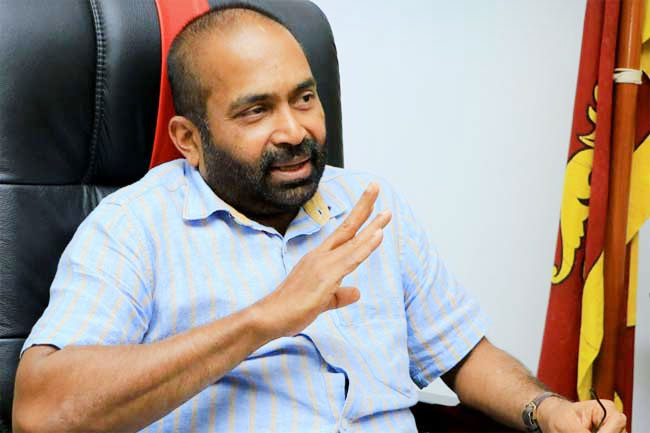
By Shamindra Ferdinanado
State Finance Minister Ranjith Siyambalapitiya has said that Sri Lanka wouldn’t have ended up being bankrupt if previous governments had adhered to agreements with the International Monetary (IMF).
Reiterating that the country is experiencing the worst ever economic crisis, lawmaker Siyambalapitiya warned that the government would be under IMF scrutiny this time around.
Appearing on weekly Hiru political programme Salakuna on Monday (26), the Kegalle District MP, who had previously served as State Finance Minister during Mahinda Rajapaksa’s tenure as the President, said that successive governments hadn’t been honest with the IMF. “We conveniently forgot what was promised to the IMF after having received a couple of tranches,” MP Siyambalapitiya said adding that the IMF would be alert now.
The State Finance Minister said that the first tranche amounting to USD 400 mn was expected in January 2023. The SLFPer emphasised that the financial mess couldn’t be settled with the USD 2.9 bn received from the IMF over a period of four years. However, the agreement with the IMF would restore the foreign governments’ faith in Sri Lanka, the State Minister mentioned.
Pointing out that Sri Lanka had received IMF loans on 16 previous occasions and the recently finalised Staf- Level agreement would lead to the 17th loan facility, MP Siyambalapitiya said that he signed the 15th agreement on behalf of Sri Lanka.
Responding to Hiru anchor Chamuditha Samarawickrema’s query whether economic crimes had been perpetrated as referred to by the United Nations Human Rights Commissioner’s latest report on Sri Lanka, lawmaker Siyambalapitiya said that there were no such crimes here. Therefore, the Geneva statement was not applicable to Sri Lanka. But, when Samarawickrema pressed the Minister on the accountability on the part of former President Gotabaya Rajapaksa’s government for the economic fallout, the lawmaker acknowledged the wrongdoing on their part.
Commenting on former President Gotabaya Rajapaksa’s government depriving the Treasury of over Rs 500 bn by implementing a wide tax cut, soon after the last presidential election, State Minister Siyambalapitiya faulted those who advised the President on economic matters. The State Minister said that the economy was handled by Presidents and Ministers who didn’t know the subject. When Samarawickrema pointed out that the former President was advised by Dr. P.B. Jayasundera, MP Siyambalapitiya said that he didn’t know that. Subsequently, MP Siyambalapitiya acknowledged the role played by Dr. PBJ, who then functioned as Secretary to the President, and previously as Secretary to the Treasury.
During an heated exchange, the State Finance Minister said that the then government reduced the number of tax files from 1.5 mn to 400,000 and the number registered taxpayers from 1.7 mn to 500,000. The MP said that the country was in a pathetic state today as successive governments followed wrong economic policies. The Covid-19 eruption in 2020 and external factors, too, contributed to the overall deterioration of the situation, the MP said.
In spite of clear indications that the country was heading for an unprecedented crisis, the powers that be steadfastly refused to seek IMF interventions. Instead, they continued the same harmful policies.
Asked whether as the State Finance Minister he felt the need to inquire into those responsible for the economic crisis, the MP said “Geneva was conducting investigations.” Samarawickrema asked why Geneva should be placed in charge of such an investigation when the responsibility lies with Sri Lanka. The Minister said: “I won’t hand over investigations to Geneva. I acknowledge the policies followed by successive governments were utterly wrong.
State Minister Siyambalapitiya also explained actions taken by him to explore ways and means of recovering losses suffered by the Treasury as a result of reduction of duty on a kilo of imported sugar from Rs 50 to 25 cents on Oct 13, 2020. The Minister said that Sri Lanka lacked laws to deal with those who perpetrated the sugar scam, adding that one of the sugar importers immensely benefited from the duty reduction.
State Minister Siyambalapitiya strongly defended his decision to accept ministerial portfolio, regardless of specific instructions from party leader Maithripala Sirisena not to do so.
Dismissing accusations that he switched allegiance to President Ranil Wickremesinghe for personal benefit, lawmaker Siyambalapitiya said that some of them accepted portfolios, as the Samagi Jana Balavegaya (SJB), the JVP and others would never have joined the government. They always feared the consequences of President Wickremesinghe overcoming the crisis, MP Siyambalapitiya said.
Latest News
Enforcing the law against bribery and corruption is not an act of political revenge but a profound human responsibility – President
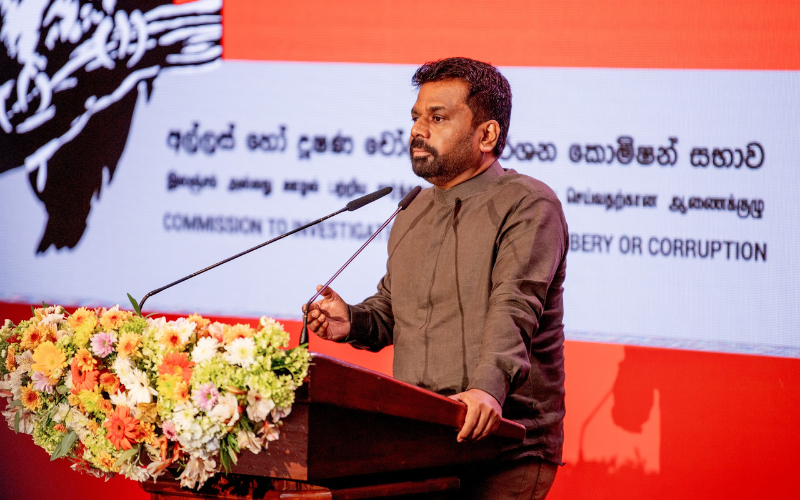
President Anura Kumara Disanayake emphasized that since assuming office, the current government has taken decisive steps to free the process of combating bribery and corruption from political interference. He reiterated that while the political mechanism has been liberated from engaging in such crimes, it is now the responsibility of the administrative machinery operating beneath that political structure to fall in line and correct its course without delay.
He explained that a grace period of six months has already been provided for the state officials to adjust to this new direction. The President firmly warned that if the public service mechanism fails to act appropriately within this period, the government will not hesitate to take firm legal action against those officials from May onwards.
President Disanayake expressed these views on Wednesday (09), participating in the launch of the National Anti-Corruption Action Plan 2025–2029, held at the Bandaranaike Memorial International Conference Hall (BMICH) in Colombo.
Bribery and corruption have proliferated, undermining the integrity and values of the country’s state institutions .He observed that over the past six months of the present government, no section of the public service has been allowed to collapse and that if officials continue to resist change, the government will proceed to remove and replace them after May.
The President pointed out that bribery and corruption have caused the nation to fall behind for decades in the eyes of the world. He reiterated that enforcing the law against these crimes is not an act of political revenge but a profound human responsibility.
The President stressed the need to build a society that respects the law and fears wrongdoing, adding that conducting lectures or workshops alone would not suffice in achieving this goal. He emphasised that people must practically witness that any person who commits a crime will be subjected to punishment under the law.
President Disanayake noted that corruption in Sri Lanka ranges from minor bribery, from the village level to bringing poor quality medicinal drugs. Bribery and corruption have escalated from minor instances to grave financial crimes, extending from local councils to looting the Central Bank.
The President further said that previous rulers safeguarded and protected those engaged in corrupt activities.
He also revealed the emergence of a network of thieves within several state administrative institutions and certain bodies responsible for enforcing the law, comprising underworld elements involved in bribery and corruption. He confirmed that these criminal networks have already been identified and assured that measures will be implemented in the future to dismantle and eliminate them.
President Disanayake solemnly pledged that the responsibility of eradicating bribery and corruption will not be passed on to the next generation but will be resolved within this generation itself, under the leadership of the present government.
Drawing a comparison with India, which gained independence a year before Sri Lanka, the President noted that through a consistent national policy framework, India has successfully achieved space exploration and built a massive workforce in the software industry. In stark contrast, he pointed out that Sri Lanka, due to poor decisions made by its political leadership, was declared a bankrupt state in 2022.
He further stated that the current government has taken on the responsibility of leading Sri Lanka towards the international stage through a national policy framework that ensures transparency and accountability for every rupee spent from public funds.
The President added that by implementing this framework, it is possible to build public trust in law enforcement and judicial institutions and that it must be made clear to the people that there will be no mechanism available for anyone to escape the law after committing a crime.
He stated that the purpose of the National Anti-Corruption Action Plan 2025-2029 is to guide the country towards becoming a nation of integrity. The government plans to establish Internal Affairs Unit within all state institutions including the Presidential Secretariat and implement a system for monitoring these units through digital technology to ensure accountability and transparency.
The Action Plan has been designed around four key strategic priority areas: prevention and public participation, institutional strengthening and the enforcement of law along with reforms in law and policy.
The President highlighted that eliminating bribery and corruption is one of the most decisive factors in a country’s development and progress. In Sri Lanka, the Commission to Investigate Allegations of Bribery or Corruption (CIABOC) has been identified as the leading state institution entrusted with strengthening this mechanism. Accordingly, it was recognised that a robust national anti-corruption policy that operates across all sectors is essential to creating a corruption-free society.
In preparing this Action Plan, CIABOC engaged all relevant stakeholders by conducting extensive programmes at both national and provincial levels. A broad public consultation process was carried out, including a comprehensive survey to assess public opinion on corruption through media announcements in all three languages and via social media networks.
This process gathered proposals from a diverse range of participants, including Members of Parliament, judges, state officials, the private sector, international organisations, civil society organisations, community-based organisations, religious groups, persons with special needs, media professionals, youth, children and the general public. Additionally, foreign state experiences and suggestions from various groups across all provinces were taken into consideration when formulating the Action Plan.
By implementing this National Anti-Corruption Action Plan, the government hopes to foster a committed citizenry determined to combat corruption, a political will fully supportive of this effort, a comprehensive legal framework and a disciplined, transparent public service across all sectors, with the shared vision of building a country of integrity for future generations.
Addressing the event, the Japanese Ambassador to Sri Lanka, Hideaki Mizukoshi, stated that Corruption remains a great challenge for many countries, including Sri Lanka as it undermines economic growth, weakens public trust in government institutions and discourages foreign investment. However, he noted that due to the reform initiatives of the present government, investors are once again showing increasing interest in Sri Lanka.
Ambassador Mizukoshi further stated that Japan has always believed that transparency and good governance are fundamental pillars for sustainable economic development and therefore, has supported anti-corruption initiatives globally for over a decade.
Meanwhile, the UNDP Resident Representative in Sri Lanka, Ms. Azusa Kubota, stated that according to Sri Lanka’s first-ever National Taxpayer Perception Survey conducted last year, 84% of respondents indicated that corruption directly affects their willingness to pay taxes.
She further noted that corruption deters investment, increases the cost of doing business, undermines sustainable development and human security, and causes an estimated annual loss of USD 1.3 trillion for developing countries.
Referring to the Budget Speech delivered by the President, Ms. Kubota emphasised that the State must be accountable for every cent of taxpayers’ money and stated that this Action Plan would serve as a roadmap for transforming Sri Lankan society.
The event was attended by the Chief Justice, Supreme Court Justice Murdu Nirupa Bidushinie Fernando; the Attorney General, Parinda Ranasinghe PC; the Secretary to the President, Dr. Nandika Sanath Kumanayake; the Chairman of CIABOC, former High Court Judge Neil Iddawela; the Director General of CIABOC, R.S.A. Dissanayake; the Commanders of the Tri-Forces; the Inspector General of Police; senior officials from the security forces and a large number of state officials.
Latest News
Sun directly overhead Hatthikuchchi, Kalankuttiya, Halmillewa, Ipalogama, Palugaswewa and Habarana at about 12:11 noon. today [10]

On the apparent northward relative motion of the sun, it is going to be directly over the latitudes of Sri Lanka during 05th to 14th of April in this year.
The nearest areas of Sri Lanka over which the sun is overhead today (10th) are Hatthikuchchi, Kalankuttiya, Halmillewa, Ipalogama, Palugaswewa and Habarana at about 12:11 noon.
News
LG elections to be staggered
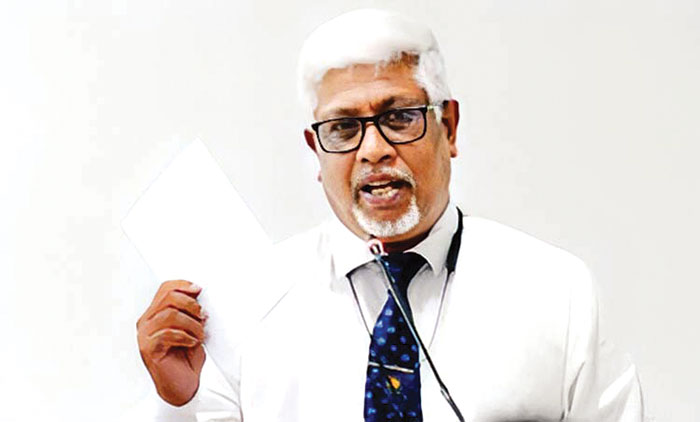
Signs are clear that the local government (LG) elections, originally scheduled for 06 May, will have to be held on a staggered basis, as nomination lists in respect of about 200 out of 339 LG institutions have been challenged before the Court of Appeal, according to sources.
Those who have filed cases in the Court of Appeal seek writs against holding the elections. The final date for filing cases is 21 April.
By yesterday only 113, out of 339 local government bodies, had been cleared for the 06 May elections, with no rejections of nomination lists, or objections, sources said. The nomination lists for 226 local government bodies have been rejected, and candidates on these rejected lists are entitled to file cases against the Election Commission (EC) until 21 April.
The Court of Appeal (CA) has ordered that some of the lists rejected by the Election Commission be accepted. However, the EC is planning to challenge all CA orders before the Supreme Court.
When contacted for comment, Director General of the Election Commission, Saman Sri Ratnayake, told The Island that all arrangements had been made to hold the elections on 06 May, in accordance with the provisions of the Local Authorities Elections (Amendment) Act No. 16 of 2017.
“We will hold elections to the local government bodies for which there are no legal barriers, and this will depend on the final decision of the courts,” Ratnayake said, adding that elections to other local government bodies would be held on later dates.
By Saman Indrajith
-

 Business4 days ago
Business4 days agoColombo Coffee wins coveted management awards
-

 Business6 days ago
Business6 days agoDaraz Sri Lanka ushers in the New Year with 4.4 Avurudu Wasi Pro Max – Sri Lanka’s biggest online Avurudu sale
-

 Features5 days ago
Features5 days agoStarlink in the Global South
-

 Business7 days ago
Business7 days agoStrengthening SDG integration into provincial planning and development process
-

 Business6 days ago
Business6 days agoNew SL Sovereign Bonds win foreign investor confidence
-

 Features2 days ago
Features2 days agoSri Lanka’s Foreign Policy amid Geopolitical Transformations: 1990-2024 – Part III
-

 Features5 days ago
Features5 days agoModi’s Sri Lanka Sojourn
-

 Midweek Review2 days ago
Midweek Review2 days agoInequality is killing the Middle Class



